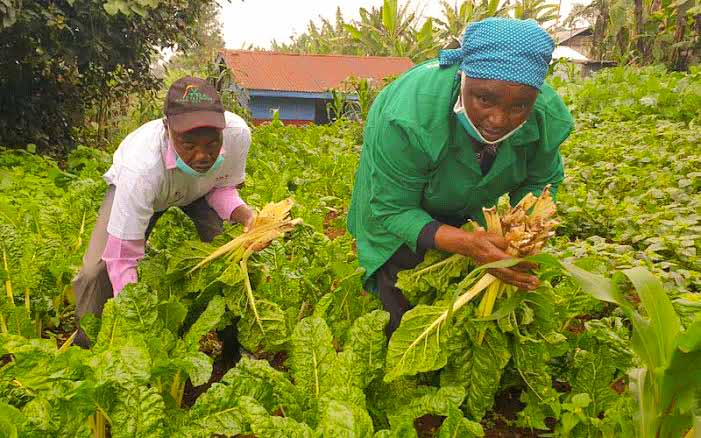News
Organic agriculture offers viable options against COVID through improved nutrition, poverty reduction

Growing of vegetables empowers farmers but also improves the health of consumers
The COVID-19 pandemic has once again proved that eating organically produced food is not merely a privilege for the rich but also as an essential tool for everyone to fight disease.
As the world commemorates World Food Day today October 16, Ugandans are being urged to invest more energy in promoting organic agricultural practices because of their ability to produce safe, nutritious and diverse foods that are essential in warding off infections among humans, but also for preserving balance in the ecological system.
The Participatory Ecological Land Use Management (PELUM) Uganda, an umbrella organization that represents an estimated 3 million smallolder farmers groups engaged in organic agriculture in Uganda, argues that eco-farming not only offers an opportunity to tackle malnutrition but can also helps to empower millions of rural farmers rise from poverty.
The theme for this year’s World Food Day is: “Our actions are our future – Better production, better nutrition, a better environment and a better life”
PELUM says the theme speaks to its mission and goals.
“The theme speaks to the core of our work to advance Agroecology and organic farming in Uganda for better production, better nutrition, a better environment and a better life,” it says
“Our work is to improve the livelihoods of small-scale farmers and the sustainability of rural communities through the fostering of ecological land use management. Interventions are undertaken through a broad network of 65 like- minded NGOs that have a presence in over 122 districts and reach over 3 million smallholder farmers in Uganda.”
The World Health Organization estimates that more than 600 million people fall ill and 420,000 die every year from eating food contaminated with bacteria, viruses, parasites, toxins or chemicals.
But according to PELUM the figures are just a tip of the iceberg since comprehensive surveillance data for foodborne illnesses is not available everywhere.
“When food is not safe, humans cannot benefit from its nutritional value and cannot grow and develop. In the face of the Covid 19 global pandemic, consumption of natural, safe, diverse, nutritious food can build our immune systems to fight the virus as well as recover from the disease,” says PELUM.
“Organic agriculture presents a great opportunity for Uganda to address the multiple challenges of food insecurity, malnutrition, land and forest degradation estimated at 2.2% per annum (NEMA, 2018) and poverty that is especially higher among the rural agricultural based population which presents majority of Uganda’s population.
“Uganda has approximately 262,282 hectares under Organic production and is ranked in 4th position globally and 2nd position for number of organic farmers (IFOAM, 2020).
“Despite the comparative advantage, the country only enjoys 5% market share of the rapidly growing organic market. The country exports organic products worth 50 million USD which accounts for over 17% of agricultural exports (NOAP, 2019). Scaling up Agroecology therefore has great potential for contributing to Uganda’s socio-economic transformation.
PELUM says it is working with several stakeholders to promote eco-friendly agriculture and improve the livelihoods of smallholder farmers in Uganda and other African countries.
In Uganda PELUM says it is working with local partners such as St. Jude Family projects in Masaka and Kulika Uganda center in Lutisi – Wakiso as well as Uganda Martyrs University Nkozi.
And at the continental level, PELUM’s work is supported by the Knowledge Centre for Organic Agriculture in Africa (KCOA) project. The KCOA project is being implemented by by the Germany government through GIZ.
“Together with these partners, we are collecting, validating and disseminating organic agriculture knowledge and practices and using this knowledge to promote networking within agricultural value chains. We have made great strides in strengthening Centers of Excellence and farmer level demonstration sites on organic agricultural practices as well as strengthened capacities of 6 Master Trainers in organic agriculture practices. The 6 Master Trainers have so far empowered 272 Multipliers and 152 farmer leaders in organic agriculture.
“Through our various country level interventions, we are contributing to efforts by the Food and Agriculture Organization (FAO) of the United Nations to scale up Agroecology among member states as well as efforts on implementation of the 2011 African Union decision on establishment of an African organic farming platform based on available best practices; and to provide guidance in support of the development of sustainable organic farming systems and improve seed quality.
Comments


















